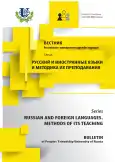№ 1 (2009)
- Год: 2009
- Статей: 15
- URL: https://journal-vniispk.ru/2618-8163/issue/view/23454
Статьи
Релевантность понятия «мировоззрение» в системе обучения иностранным языкам
Аннотация
В статье рассматривается комплекс философско-психологических идей, определяющих формирование мировоззренческой системы обучения иностранным языкам. Особое внимание уделяется анализу мотивационного комплекса процесса обучения, а также влиянию личностных характеристик участников учебной деятельности на успешность/неуспешность обучения.
Русистика. 2009;(1):5-10
 5-10
5-10


Антиномичность как типологическая особенность древнехристианской литургической поэзии
Аннотация
Анализируются риторические формы выражения философско-теологических антиномий в контексте отечественной феноменологической герменевтики. На материале древних славянских рукописей автор рассматривает универсальные принципы переработки исходных формул, особенности перевода византийской гимнографии на древнеславянский язык.
Русистика. 2009;(1):11-18
 11-18
11-18


 19-25
19-25


 26-31
26-31


 32-35
32-35


Соматические речения в баснях И.А. Крылова
Аннотация
Исследуются соматические речения, использованные для характеристики чувств и душевных состояний героев басен И.А. Крылова. Сделаны выводы о функциях соматических речений в баснях и об их особенностях. Особое внимание уделено соматическим речениям, содержащим национально-культурную информацию, а также случаям индивидуально-авторского использования соматических речений.
Русистика. 2009;(1):36-41
 36-41
36-41


 42-46
42-46


 47-54
47-54


Современные психолингвистические проблемы обучения русскому языку как иностранному
Аннотация
Основной целью комплекса «Психолингвистические проблемы обучения РКИ» является повышение уровня знаний студентов - будущих преподавателей русского языка как иностранного (РКИ) - в области психолингвистики, ее положений и законов, которые определяют методические приемы преподавания РКИ.
Русистика. 2009;(1):55-62
 55-62
55-62


 63-69
63-69


Мотивация именования птиц в русском и немецком языках
Аннотация
Рассматривается проблема мотивации орнитонимов в русском и немецком языках, исследуется типология мотивировочных признаков данной лексико-семантической группы. Выделены наиболее активные мотивировочные признаки, положенные в основу наименований птиц в обоих языках.
Русистика. 2009;(1):70-77
 70-77
70-77


Русский язык у иностранцев XVI-XVII вв.
Аннотация
В статье отражена история восприятия и передачи русских слов на материале записок о Московии С. Герберштейна и А. Олеария в XVI-XVII вв. Рассматривается их графическое и фонетическое оформление, изменение морфологического облика и лексического значения под влиянием родного языка.
Русистика. 2009;(1):78-83
 78-83
78-83


Рецензия на монографию С.К. Милославской «Русский язык как иностранный в истории становления европейского образа России»
Русистика. 2009;(1):84-86
 84-86
84-86


Аннотация монографии Т.Е. Постновой «Прецедентные тексты в рекламе»(М.: Издательство МГОУ, 2007, 126 с.)
Русистика. 2009;(1):87-88
 87-88
87-88


Аннотация учебного пособия Р.Т. Касымовой «Язык в условиях межкультурной коммуникации»(Алматы, 2007)
Русистика. 2009;(1):89-90
 89-90
89-90











